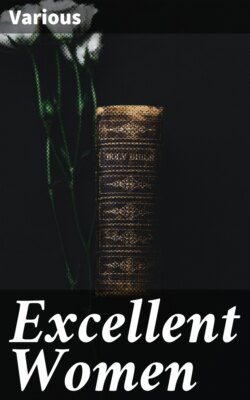Читать книгу Excellent Women - Various - Страница 35
На сайте Литреса книга снята с продажи.
HER CONVERSION.
ОглавлениеAt Donnington Park the Countess began the kindly and charitable deeds for which she afterwards became so noted. Her religious feelings were strong, and she strove earnestly to discharge fully her responsibilities to both God and man. And yet, as she afterwards came clearly to see, she was ignorant of the true nature of the Gospel, and she was attempting, by strict adherence to prayer, meditation, right living, and charitable action, to justify herself in the sight of God. But, all unknown to her, the mighty religious awakening begun at Oxford in 1729, and publicly preached in 1738 by Whitefield and the Wesleys, was destined to be the cause of her spiritual awakening also. Lady Margaret Hastings and Lady Betty Hastings, the Earl of Huntingdon's sisters, had come at Oxford under the influence of the Methodist movement. While on a visit at Ledstone Hall, in Yorkshire, they received great blessing under the preaching of Benjamin Ingham, a well-known member of the Holy Club, whom in 1741 Lady Margaret married. They both received the truth as it is in Jesus, and were led by the influence of the Holy Spirit to labour and pray for the salvation of their relatives and friends. In talking with her sister-in-law one day, Lady Margaret affirmed "that since she had known and believed in the Lord Jesus Christ for life and salvation she had been as happy as an angel."
These words depicted an experience so different from her own that they exerted a very abiding influence upon Lady Huntingdon's thoughts. She felt her need, she was conscious of sin, and yet the more she strove to attain salvation the further she seemed removed from it. "A dangerous illness having, soon after, brought her to the brink of the grave, the fear of death fell terribly upon her, and her conscience was greatly distressed. She now perceived that she had beguiled herself with prospects of a visionary nature; was entirely blinded to her own real character; had long placed her happiness in mere chimaeras, and grounded her vain hopes upon imaginary foundations. It was to no purpose that she reminded herself of the morality of her conduct; in vain did she recollect the many encomiums that had been passed upon her early piety and virtue. Her best righteousness now appeared to be but 'filthy rags,' which, so far from justifying her before God, increased her condemnation. When upon the point of perishing, in her own apprehension, the words of Lady Margaret returned strongly to her recollection, and she felt an earnest desire, renouncing every other hope, to cast herself wholly upon Christ for life and salvation. From her bed she lifted up her heart to her Saviour, with this important prayer, and immediately all her distress and fears were removed, and she was filled with peace and joy in believing. … Her disorder from that moment took a favourable turn; she was restored to perfect health, and, what was better, to newness of life. She determined thenceforward to present herself to God, as a living sacrifice, holy and acceptable, which she was now convinced was her reasonable service. … No sooner was her heart surrendered to God, and her alienated affections restored to their original claimant, than outward fruits appeared in her conversation: her renovation introduced new light into her understanding, and new desires into her heart and affections, and produced its effect upon her temper; not wholly to eradicate its constitutional peculiarity, but to sanctify and render it subservient to the glory of God and the good of souls." [1]
The Countess on recovering from her illness, hearing that John and Charles Wesley were preaching near by, sent them a message wishing them God-speed and testifying to her own purpose to live entirely for the Saviour who had died for her. Her friends failing in their attempt to persuade her husband to exert his influence against what they considered fanaticism, enlisted the aid of Dr. Benson, Bishop of Gloucester, who had been Lord Huntingdon's teacher. But the bishop, as many another in later days, found that the Countess was fully equal to giving cogent reasons for her faith and practice. It was he who had ordained Whitefield, and to the latter the bishop ascribed the change in her opinion. So far from accepting the bishop's view, the Countess urged home upon him her opinion of his duty, enforcing her argument with such apt quotations from the Bible, the Articles, and the Homilies, that at length he left her presence openly regretting the fact that he had ever laid his hands upon Whitefield's head. "My Lord," was the last word of the Countess, "mark my words: when you are on your dying bed that will be one of the few ordinations you will reflect upon with complacence." It is pleasing to know that when on his death-bed in 1752, this prelate sent to Whitefield, and asked to be remembered in his prayers.
[Footnote 1: The Life and Times of Selina, Countess of Huntingdon, vol. 1. pp. 14, 15.]
